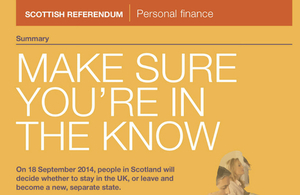Scottish independence referendum: Personal finance pack launched
Latest In the Know factsheet highlights how the UK helps safeguard the finances of Scottish people.

The key ways the UK helps safeguard the personal finances of people in Scotland are highlighted in the latest UK Government In the Know pack, which is launched today.
In the Know focuses on household bills including the everyday things we need and essentials like energy, mortgage bills, pensions and savings, setting out the full facts about the effect an independent Scotland could have on household budgets.
This follows on from last week’s report from the UK Treasury that said that every Scot would be £1,400 better off every year living in a united kingdom.
Here’s what staying in the Union means for Scottish household budgets and savings:
- £2,000 – how much tax-free childcare support per child that the UK Government is making available to working parents from autumn 2015
- £1,700 – how much mortgage interest costs could rise by in an independent Scotland, on the first year of repayments alone, for a 75% loan-to-value mortgage on the average Scottish house
- Up to £189 – how much lower future energy bills are kept for Scottish households each year, as part of the UK
- £11 – how much cheaper it is to fill up the average car, following the UK Government’s freeze on fuel duty
- £10,500 – by 2015/16, you’ll be able to earn this amount before paying income tax, and since 2010 over 260,000 Scottish workers have been lifted out of income tax altogether
- £15,000 – from July 2014, you can save this amount tax-free in a UK ISA
- 51% – the percentage of Scottish customers who buy their mortgages from firms in the rest of the UK
- 70% - the percentage of Scottish consumers who buy their private pensions from firms in the rest of the UK
Chief Secretary to the Treasury Danny Alexander said:
I am determined that people have access to the full facts needed to make one of the most important decisions in Scottish history. People are rightly concerned about how their families’ finances could be affected by independence.
That’s why we’re publishing ‘In the Know’ which sets out for families how essential costs like housing and energy bills are kept lower in the UK.
The pack sets out five key things that show how Scotland’s finances are stronger as part of the United Kingdom.
-
We keep the pound, one of the world’s strongest and most stable currencies giving us more certainty on the value of our savings, power to purchase the everyday things we need, as well as underpinning our jobs, our mortgages and savings
-
We have a larger, more stable economy, which means the UK can borrow money more cheaply. This helps keep your mortgage and loan interest rates lower. The National Institute of Economic and Social Research concluded that an independent Scotland would be likely to face higher interest rates on its borrowing - up to 1.65% higher than the rest of the UK. Because the UK’s interest rates are lower, borrowing costs passed on to your mortgage are also lower
-
We are stronger together. The United Kingdom economy is the sixth largest in the world, and is set to recover faster than any other G7 nation. Our collective size, strength and diversity allow us to grow and succeed together, and help us to protect jobs in difficult times. For example, in the financial crisis in 2008, the UK Government was able to provide Scottish banks with support worth more than twice Scotland’s national income
-
We share vital public services. Scotland benefits from over 200 United Kingdom institutions and services, including the BBC, Her Majesty’s Passport Office, the National Lottery, the DVLA and the Post Office. It costs us all the same amount of money to use the vast majority of these services, wherever we live
-
We have safe savings and pensions. With Scotland in the UK, our savings are protected by a guarantee covering deposits of up to £85,000 in any UK bank or building society. We also have greater choice and security when it comes to retirement. The state pension is paid at the same level across the UK, and the costs are shared by the UK’s 31 million taxpayers